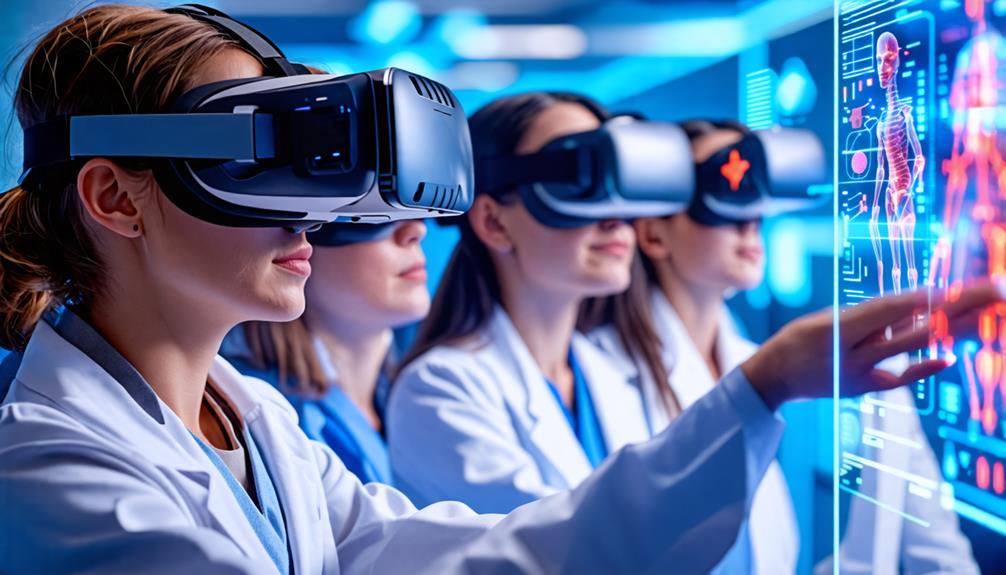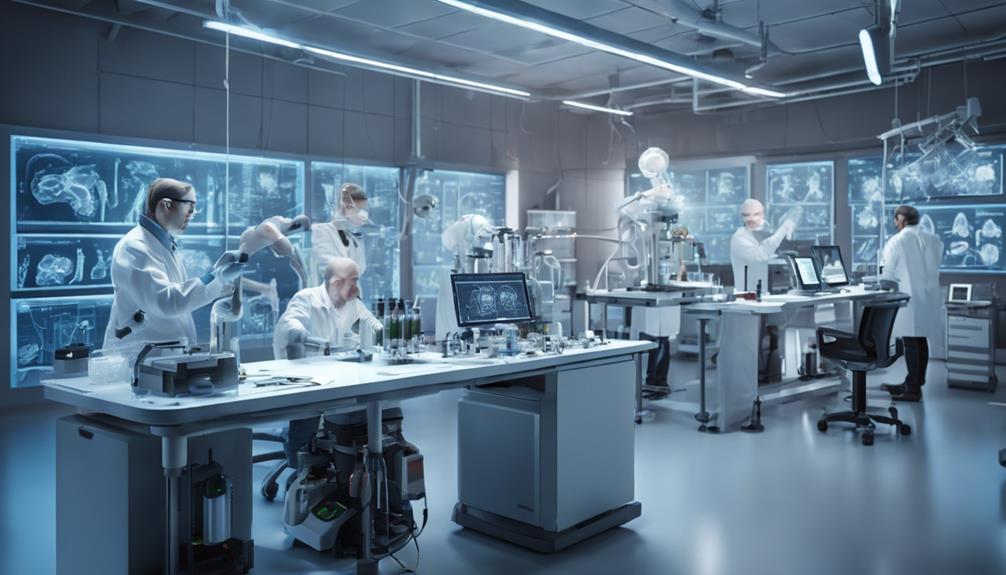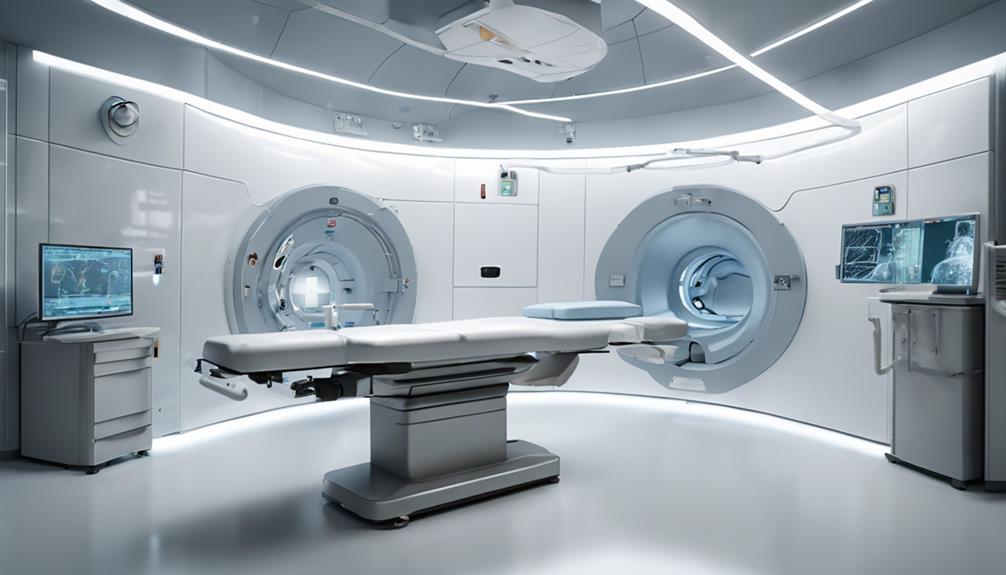
The best medical technology course for you depends largely on your interests and career aspirations within the healthcare sector. If you're drawn to diagnosing diseases, Clinical Laboratory Sciences might suit you, as it involves critical evaluation of blood, urine, and other patient samples. Alternatively, if you're fascinated by medical imaging, a course in Diagnostic Imaging could be ideal, utilizing technologies like MRI and CT scans to aid in patient care. For those interested in merging technology with healthcare innovations, Biomedical Engineering or Medical Informatics offer pathways to transform patient outcomes through cutting-edge developments and data management. Each field offers a unique way to impact patient health and continues to evolve with technological advancements, promising a rewarding career that keeps you at the forefront of medical innovation.
Exploring Clinical Laboratory Sciences

Clinical laboratory sciences offer you a crucial role in diagnosing and managing patient care through rigorous testing and analysis. In this dynamic field, you're at the heart of medical decision-making. Working behind the scenes, you conduct tests on patient samples, including blood, urine, and other body fluids, to detect the underlying causes of symptoms and diseases.
Your role extends beyond mere testing; you're also involved in confirming the accuracy of test results and reporting findings to physicians. This information is pivotal in guiding the treatment plans that doctors devise for their patients. Moreover, your expertise contributes to monitoring the effectiveness of treatments, ensuring that patients receive the most appropriate and timely medical interventions.
Choosing to specialize in clinical laboratory sciences means you're stepping into a world of microscopic marvels. You'll learn to operate advanced laboratory equipment and stay updated on the latest methodologies to enhance your analytical skills. This isn't just a job; it's a career that demands precision, critical thinking, and a commitment to patient health.
As you consider your educational path, remember that your work in clinical laboratory sciences could be the key to unlocking crucial medical insights that save lives.
The Role of Diagnostic Imaging
As you delve into diagnostic imaging, you'll discover its critical role in modern medicine, providing essential insights that guide diagnosis and treatment. It's fascinating how these technologies allow you to peer inside the human body without a single incision.
Techniques like X-rays, CT scans, and MRI are pivotal in uncovering hidden ailments, confirming suspected issues, and even monitoring the progress of treatment.
You're probably wondering how this knowledge can shape your career. Well, specializing in diagnostic imaging not only equips you with the expertise to operate advanced machinery but also sharpens your analytical skills. You'll learn to interpret complex images, a skill that's highly valued in healthcare settings.
Each scan you analyze could be the key to solving medical puzzles – identifying a fracture, spotting a tumor, or even catching signs of an infectious disease.
Moreover, your role extends beyond diagnosis. In emergency rooms, for instance, quick and accurate imaging can be lifesaving. It's not just about taking pictures; it's about providing clarity in critical situations.
Thus, diving into this field not only promises a dynamic career but also offers the profound satisfaction of making a real difference in patient care.
Advances in Biomedical Engineering

Building on the foundation of diagnostic imaging, advances in biomedical engineering continue to revolutionize how we understand and treat the human body. You're now witnessing a field where innovation is a constant, and the implications for patient care are profound.
Imagine devices that not only monitor health in real-time but also predict potential threats before they become serious. That's where we're headed.
Biomedical engineering has given rise to technologies such as bio-printing, allowing scientists to fabricate biocompatible organs and tissues. You might find it fascinating that researchers are developing materials that mimic human skin, bone, and even organs. These breakthroughs could mean the end of transplant waiting lists and the beginning of a new era in personalized medicine.
Moreover, neuroengineering is pushing the boundaries of how we treat neurological disorders. Techniques like deep brain stimulation, originally used for Parkinson's disease, are now being explored to treat depression and even restore cognitive functions in Alzheimer's patients. It's not just about treating conditions, but enhancing the quality of life.
As you delve into this field, you'll see how integrating electronics with molecular biology is paving the way for innovations like implantable devices that release drugs in response to body signals.
The future is here, and it's filled with possibilities that today's biomedical engineers are actively turning into realities.
Careers in Medical Informatics
In the realm of medical informatics, you'll find diverse career opportunities that leverage technology to improve healthcare outcomes. As you explore this field, you'll discover roles such as a Clinical Informatics Analyst, who transforms data into insights that enhance patient care.
You could also become a Health Informatics Consultant, advising healthcare facilities on the best tech solutions for their needs.
If you're intrigued by the intersection of IT and healthcare, a career in Health IT Project Management might suit you. You'll oversee projects that implement new technologies in medical settings, ensuring they meet clinical requirements.
Meanwhile, as a Medical Informatics Researcher, you'd push the boundaries of what medical technologies can achieve, contributing to scientific studies and innovation.
Each of these roles requires a unique blend of skills, typically a mix of technological proficiency and an understanding of healthcare operations. Educationally, you're looking at degrees in health informatics, computer science, or a related field, often complemented by certifications in specific technologies or methodologies.
Choosing to pursue a career in medical informatics means you're at the forefront of enhancing healthcare delivery through technology. It's a field where your work directly contributes to improved health outcomes and efficiencies in medical care.
Understanding Radiation Therapy

Radiation therapy plays a crucial role in treating various types of cancer, using high-energy rays to target and destroy cancer cells. If you're considering a career in this field, you'll be directly involved in patient care, often seeing tangible results from your work.
In a typical radiation therapy course, you'll learn about the physics of radiation, how it interacts with body tissues, and how to calculate the correct dose for treatment. Safety is paramount, so you'll also study how to minimize exposure to healthy tissues and manage side effects in patients.
As technology advances, so does the scope of radiation therapy. You'll get hands-on training with sophisticated equipment like linear accelerators and learn about newer techniques such as stereotactic radiosurgery and proton therapy. These are precise methods that offer hope for better outcomes with fewer side effects.
Courses usually combine theoretical knowledge with clinical placements, giving you a real-world feel of the work environment. You'll collaborate with oncologists, physicists, and other healthcare professionals, preparing you for a multidisciplinary approach in healthcare.
Choosing a career in radiation therapy not only equips you with specialized medical technology skills but also places you at the heart of patient recovery and care. It's a field where you can truly make a difference.
Frequently Asked Questions
What Are the Prerequisites for Enrolling in a Medical Technology Course?
To enroll in a medical technology course, you'll typically need a high school diploma or GED. Backgrounds in biology, chemistry, and math are often required, and some programs might demand specific coursework or certifications.
How Long Does It Typically Take to Complete a Medical Technology Course?
Typically, you'll spend about two to four years completing a medical technology course, depending on whether you're aiming for an associate degree or a bachelor's degree in the field.
Are There Online Options Available for Studying Medical Technology?
Yes, you can find several online courses in medical technology. They offer flexibility and allow you to study from anywhere, fitting your schedule while providing the necessary skills and accreditation for the field.
What Are the Typical Costs Associated With Medical Technology Courses?
You'll find that costs for medical technology courses vary widely, typically ranging from a few thousand to tens of thousands of dollars, depending on the institution, program length, and degree level.
How Does a Medical Technology Certification Impact My Career Prospects?
A medical technology certification significantly boosts your career prospects by enhancing your credibility, expanding your skill set, and increasing your marketability to potential employers in the healthcare and diagnostic sectors.
Conclusion
You've explored various medical technology courses, each with its unique strengths. Whether it's delving into Clinical Laboratory Sciences, mastering Diagnostic Imaging, pushing boundaries in Biomedical Engineering, navigating the data-driven field of Medical Informatics, or understanding the intricacies of Radiation Therapy, the best course depends on where your passion lies.
Consider what excites you most and where you see yourself making an impact. Your ideal path in medical technology is where your interests and the industry's needs intersect.






